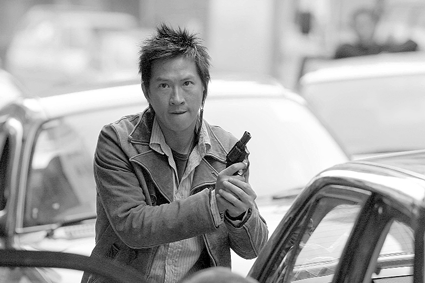Uninspired Hong Kong actioner stages facile media circus
What makes Johnny run? “Breaking News,” the 37th film by veteran Hong Kong director Johnny To Kei-fung, isn’t even his latest—he’s whipped out four more since, with the two most recent simultaneously in production. Averaging two features annually, To is clearly a man in a hurry. But in “Breaking News,” at least, haste yields waste.
A well-regarded fixture of the Hong Kong industry, To is a versatile, workmanlike director whose patchy output is nonetheless elevated by such distinctive films as “Eighth Happiness” (1988), “Lifeline” (1997), and “The Mission” (1999). Screened out of competition at Cannes 2004, “Breaking News” is not one of To’s most accomplished efforts, its initial premise of a tense gangland opera dispersed into a fairly routine procedural that grasps at relevance with stale truisms about the news media.
“Breaking News” opens with an elaborate seven-minute crane shot, in which the stakeout by hard-bitten Inspector Cheung (Nick Cheung) of a heist in progress is blown by a pair of traffic cops, cueing the first of many prolonged shootout sequences. The thieves, a practiced unit, helmed by the cool, quietly dreamy Yuen (Richie Jen), make off in a hijacked ambulance. In close pursuit, Cheung’s squad bolts past a news-gathering crew taping an accident scene, who record the criminals’ trouncing of the police and Yuen’s shooting of an abjectly terrified, middle-aged officer.
The ostensible public outcry over this lapse in security goads the law into desperate, compensatory action. At a police triage summit, the ambitious neophyte Inspector Rebecca Fong (Kelly Chen) scores by espousing an aggressive media strategy to stanch unrest and reassert the spectacle of authority in action. The chief immediately warms to her pitch, setting up a de-dramatized rivalry with Superintendent Yeung (Cheung Siu-Fai), who mostly sits around looking pained and replying, “Yes, madam.”
Instantly promoted to deputy commander of the operation, Rebecca accessorizes the police tactical forces with spycams and sets up mobile command outside the dingy apartment tower where, Cheung’s squad has discovered, the gang is ensconced. With Rebecca spitting orders like one of the hoods’ automatic rifles, the heavily equipped forces make a to-do of evacuating the building, while the polished flack Grace (Maggie Shiu) parries irate talk-show hosts and keeps the reporters on message.
Yuen and his sidekick take refuge in a tenant’s apartment, but once again, suspense is dissipated through ham-fisted comic business with the tenant’s two young children. As the script gods would have it, there’s a world-weary hit man already hiding out in the same apartment block with his lackey; naturally the plot contrives to toss the criminals together, and the hapless tenant’s flat becomes a cozy bunker from which Yuen matches wits with Rebecca, simultaneously sparring and flirting via webcam.
To forfeits all narrative momentum and never regains it, despite the tenant’s dive out a window and a standoff in an elevator shaft. In the culminating chase one marvels anew at the HK industry convention of stars performing their own stunts when Nick Cheung gets walloped by a car while running through traffic. Though intended as the very image of cop tenacity, Cheung’s blockhead pursuit right up until the end instead evokes a beagle that, led far afield by a scent, can’t find its way home.
Chen’s Rebecca, by contrast, seems to derive her authority from command of her own self-willed image. Introduced amid the uproar over the footage of Yuen’s cop takeout, Rebecca appears from nowhere, reflected in the plate glass windows of police headquarters, immediately established as an ethereal object of viewer consumption. Her power-grab succeeds because she’s so clearly mastered her own public presentation.
For all its technolust, “Breaking News” illuminates precious little about the actual workings of the news media, postulating a sort of giant colicky infant requiring constant diversion with lurid sensation; Rebecca promises it “feeds” of fresh incident every half hour. The film instead betrays a furtive anxiety about the status of the cinema itself, at a moment when audiences are rapidly migrating to Internet-based and wireless outlets for their movie fix, and the celluloid image is displaced by the digital.
In this light, the familiar HK-style promiscuity of tone—bouncing from furious gunplay to fart gags to kiddy kitsch, all within an ostensibly straight thriller framework—grows tinged with a faint melancholy, as if pleading, “Don’t we entertain you well enough?”
To is thoroughly a video-era director, yet in “Breaking News” the tokens of change—the cellphone-camera, the Webcast—retain their foreignness, and it’s tempting to imagine that in their cruddy, addictive low-res images, he might glimpse the obsolescence of his métier.
gaycitynews.com


































